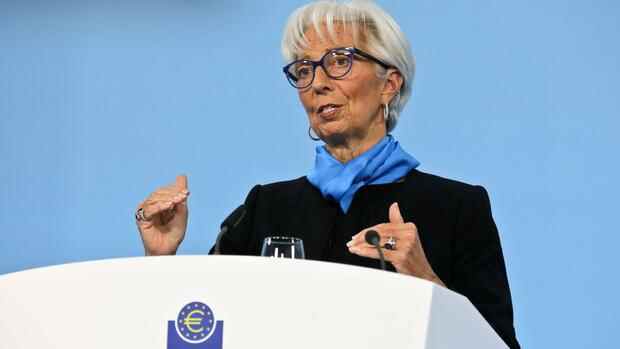The head of the ECB warns that without a European offering of their own, other digital currencies will gain in importance.
(Photo: imago images / Hannelore Förster)
Brussels, Berlin, Frankfurt Christine Lagarde had prepared herself with a Powerpoint presentation when she appeared at the Eurogroup meeting in Brussels last week. The appearance was of great importance for the head of the European Central Bank (ECB). Slide by slide, she informed the finance ministers about one of the ECB’s most important projects: the digital euro.
Lagarde emphasized one point in particular. The digital euro is not only a desirable innovation in payments, it is also an instrument for strengthening Europe’s sovereignty. Without a European offering of their own, Lagarde warned, other digital currencies would gain in importance in Europe, and the power of international credit card companies in the European market would continue to grow.
She specifically mentioned stable coins, i.e. crypto assets whose value is linked to other currencies or assets. The largest stable coin in the world is currently Tether, which is linked to the development of the US dollar. Possibly the upheaval in the payment system could even be so profound that the ECB’s monetary policy loses its economic control.
Lagarde’s presentation left an impression on the ministers – the sovereignty argument caught on with governments and the Commission. This week the talks in Brussels should continue, on Thursday ECB Director Fabio Panetta will explain the project in the European Parliament.
Top jobs of the day
Find the best jobs now and
be notified by email.
Germany and France in particular are following the central bank’s plans with great interest. “I welcome the fact that the ECB has further intensified its work on the digital euro,” said German Finance State Secretary Jörg Kukies to the Handelsblatt. “As one of the world’s most important economic areas, Europe has to help shape current developments in the field of electronic payment processes through its own considerations right from the start.”
Dealing with the digital euro sanctions
Politicians have recognized the strategic potential of digital currencies. One example is the evasion of sanctions. The issue has high political priority. For more than a year, MPs, top officials and think tank experts from Germany and France have been racking their brains over how Europe can strengthen its resistance to sanctions.
The digital euro is one of the proposals the task force is discussing. In the euro countries and the EU Commission there is hope that the digital euro will make payments beyond the reach of American sanctions.
“With a digital currency, the transparency of transactions for outsiders can be greatly reduced. That makes it harder to impose targeted economic fines, ”says Jonathan Hackenbroich from the European Council on Foreign Relations (ECFR), who coordinates the deliberations of the sanctions task force. “However, digital currencies could also open the door to financial crime.”
In her presentation to the finance ministers, Lagarde also addressed the risk of promoting money laundering. One way out would be to make the payment data available to a control authority. However, there is then also a growing risk that foreign secret services will tap into the sensitive information. In addition, countries like the USA could target the clearing houses for digital currencies with their sanctions – or even the central banks themselves.
A balancing act awaits the head of the project
The debate is complex, but it shows that Lagarde’s prestige project is also of enormous political relevance. Managing the desires of politics will be one of the main tasks of the ECB in the development of the digital euro. On the one hand, the central bank wants to move forward quickly, on the other hand, it must not rush anything.
Evelien Witlox will be responsible for this balancing act in the future. Last week the ECB announced that it would lead the digital euro project from January 2022. Up until now she was the head of global payments at ING, a major Dutch bank. In a two-year study phase, the ECB wants to define the properties of the digital euro by October 2023. After that, their council should decide again whether they want to introduce the digital currency.
Shortly after taking office, Lagarde had formulated the claim to be “ahead of the times” on the subject. The digital euro is very important to French central bank representatives. This is no coincidence: the strengthening of the EU’s strategic autonomy is at the heart of French European policy. Bundesbank President Jens Weidmann was more critical. He repeatedly warned of the risks to the financial system that are associated with digital central bank money.
Because the security of the digital euro from failure brings difficulties. In a crisis, a dynamic can develop in which everyone wants to exchange their assets for digital euros and withdraw them from the banks, which in extreme cases leads to the collapse of the institutes. Up until now you had to queue up at the counter for such a bank run. In order to limit the risk, the ECB is considering introducing an upper limit of 3000 euros for the digital euro.
The example of Sweden shows how great the challenges are. There, the central bank wanted to issue a digital Swedish krona by 2018. She missed this goal. Outside of Europe, China’s central bank is testing the digital currency E-Yuan in individual metropolises.
More: The big inflation bet of the ECB – Is central bank chief Lagarde underestimating the risks?
